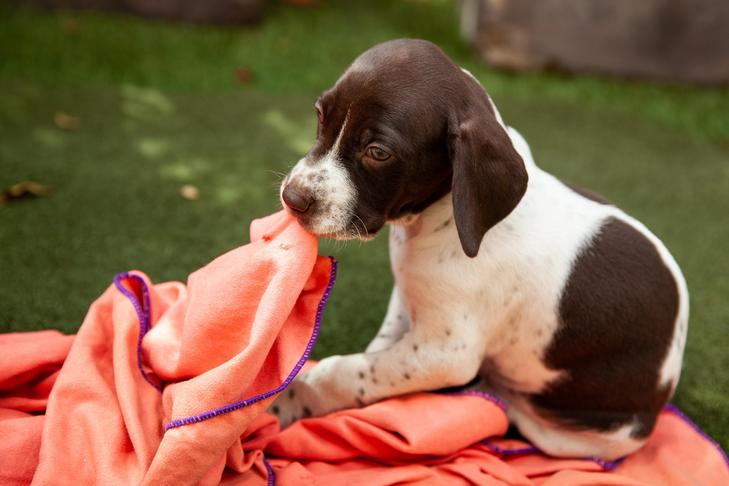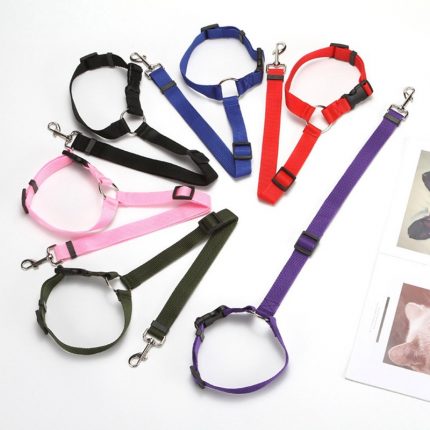Why Does My Dog Lick Blankets?
As a dog owner, you may have noticed your furry companion engaging in some peculiar behaviors. One such behavior that often leaves pet owners puzzled is their dog’s tendency to lick blankets. While it may seem strange at first, there are actually several reasons why dogs engage in this behavior.
Firstly, licking is a natural instinct for dogs. From a young age, puppies learn to lick their mother as a means of communication and bonding. This behavior carries over into adulthood, and dogs often use licking as a way to express affection and seek comfort. Blankets, with their soft and familiar texture, can become a surrogate for their mother or a source of comfort for dogs.
Another reason why dogs lick blankets is due to their keen sense of smell. Dogs have a highly developed olfactory system, and blankets can retain various scents that are intriguing to them. Whether it’s the scent of their owner, other pets, or even food residue, dogs may lick blankets to gather information and satisfy their curiosity.

Furthermore, licking can be a self-soothing behavior for dogs. Similar to how humans might bite their nails or twirl their hair when feeling anxious or stressed, dogs may resort to licking as a way to calm themselves down. The repetitive motion and the release of endorphins can have a soothing effect on their nervous system, helping them relax.
It’s worth noting that excessive blanket licking could be a sign of underlying health issues. If your dog’s licking behavior becomes obsessive or compulsive, it’s essential to consult with a veterinarian. They can rule out any medical conditions, such as allergies or gastrointestinal problems, which may be causing the excessive licking.
Understanding why dogs lick blankets can help us better comprehend our furry friends’ behavior and ensure their well-being. In the following sections, we will delve deeper into the main reasons behind this behavior and provide practical recommendations to address it effectively.
The Reasons Behind Dogs Licking Blankets
While it may appear odd to us, dogs have their own reasons for licking blankets. Let’s explore some of the main motivations behind this behavior:
1. Comfort and Security
Dogs are creatures of habit and seek comfort in familiar objects. Blankets, with their soft texture and scent, can provide a sense of security for dogs. Licking the blanket may remind them of their mother or littermates, offering a source of comfort and reassurance. This behavior is especially common in puppies who are still adjusting to their new environment.
2. Anxiety and Stress Relief
Just like humans, dogs can experience anxiety and stress. Licking can be a self-soothing behavior for dogs, helping them cope with these emotions. When feeling anxious or stressed, dogs may turn to licking as a way to release tension and calm themselves down. The repetitive motion of licking can have a calming effect on their nervous system, similar to how humans might engage in activities like nail-biting or hair twirling.
3. Sensory Stimulation
Dogs have a highly developed sense of smell, and blankets can hold a myriad of intriguing scents. From their owner’s scent to the smells of other pets or food residue, dogs may lick blankets to gather information and stimulate their senses. This behavior allows them to explore and understand their environment on a deeper level.
4. Boredom and Excess Energy
Dogs are active animals that require mental and physical stimulation. If they are not provided with enough exercise or mental enrichment, they may resort to repetitive behaviors like licking blankets out of boredom. Ensuring your dog receives sufficient exercise, playtime, and mental stimulation can help redirect their energy and reduce these behaviors.
5. Medical Conditions
In some cases, excessive blanket licking can be a sign of underlying medical issues. Allergies, skin irritations, or gastrointestinal problems can cause dogs to lick excessively as a way to alleviate discomfort. If you notice your dog’s licking behavior becoming obsessive or compulsive, it’s crucial to consult with a veterinarian to rule out any underlying health conditions.
Practical Recommendations to Address Blanket Licking
If your dog’s blanket licking behavior is becoming problematic or excessive, here are some practical recommendations to help address the issue:
1. Provide Alternative Chew Toys
Offering your dog a variety of chew toys can redirect their licking behavior onto more appropriate items. Look for toys that are specifically designed to provide mental stimulation and promote dental health.
2. Increase Exercise and Mental Stimulation
Make sure your dog receives enough physical exercise and mental stimulation throughout the day. Engage in regular play sessions, provide interactive toys, and consider puzzle toys that can keep their minds occupied and prevent boredom-related behaviors.
3. Create a Calming Environment
Ensure your dog has a comfortable and calming environment. Provide a cozy bed or crate with familiar scents, play soothing music, and consider using pheromone diffusers or calming sprays to create a relaxed atmosphere.
4. Consult with a Veterinarian
If your dog’s licking behavior persists or becomes obsessive, it’s essential to consult with a veterinarian. They can evaluate your dog’s overall health and behavior, rule out any underlying medical conditions, and provide further guidance or recommendations.
Conclusion
In conclusion, understanding the peculiar behaviors of our canine companions, such as why dogs lick blankets, can deepen the bond between pets and their owners. For more insights on this topic, visit geepets.com, where you’ll find a comprehensive article exploring the reasons behind this common yet curious behavior.

Additionally, for further reading and to expand your knowledge on various dog-related behaviors and how to manage them, the American Kennel Club (AKC) website at akc.org offers a wealth of resources. Whether you’re curious about your dog’s habits or seeking solutions to behavioral challenges, these resources provide valuable information for pet owners looking to understand and care for their furry friends better.
Actionable Recommendations to Address Blanket Licking
1. Provide Behavioral Enrichment
One of the key strategies to address the question, “Why does my dog lick blankets?” is to provide your dog with ample behavioral enrichment. This includes mental and physical stimulation to keep them engaged and satisfied, potentially reducing the behavior linked to the query, “Why does my dog lick blankets?” Here are some specific recommendations:
Engage in regular play sessions with interactive toys to keep your dog mentally stimulated. This approach is especially relevant if you’re trying to understand and address the concern, “Why does my dog lick blankets?” Interactive toys can redirect their licking behavior towards more appropriate objects.
Consider puzzle toys that challenge your dog’s problem-solving skills and provide mental exercise. Puzzle toys are an excellent answer to the frequent question, “Why does my dog lick blankets?” as they keep your dog’s mind occupied and away from blanket licking.
Rotate your dog’s toys regularly to keep them excited and prevent boredom. This tactic directly impacts the behavior causing you to wonder, “Why does my dog lick blankets?” By rotating toys, you keep their environment interesting and engaging, reducing the likelihood of reverting to blanket licking as a source of entertainment.
Teach new tricks or commands to keep their mind active and engaged. This is another effective strategy when dealing with the concern, “Why does my dog lick blankets?” Teaching new tricks provides mental stimulation and strengthens the bond between you and your dog, making them less likely to engage in undesired behaviors like blanket licking.
2. Establish a Consistent Routine
Dogs thrive on routine, and establishing a consistent daily schedule can help reduce anxiety, provide a sense of security, and even address behaviors such as “Why does my dog lick blankets?” Incorporating specific activities into your dog’s daily life can not only promote their physical and mental well-being but can also shed light on behaviors like “Why does my dog lick blankets?” Here’s how you can create a routine that might help:
- Set regular feeding times to establish a predictable routine, which can offer comfort to your dog and possibly reduce stress-related behaviors, including “Why does my dog lick blankets?” This predictability helps them understand when to expect food, creating a stable environment.
- Allocate specific times for exercise and play to ensure your dog gets sufficient physical activity. Adequate exercise can help mitigate anxiety and the compulsion behind actions such as “Why does my dog lick blankets?” by channeling their energy into more constructive outlets.
- Designate quiet times for relaxation and rest, which can be particularly beneficial if you’re trying to understand and address the question, “Why does my dog lick blankets?” Relaxation periods can help your dog wind down and reduce the likelihood of engaging in repetitive or stress-relieving behaviors.
- Stick to a consistent bedtime routine to promote better sleep. A well-rested dog is less likely to exhibit anxious behaviors, which could be at the heart of “Why does my dog lick blankets?” Ensuring your dog has a comfortable, quiet sleeping area can help minimize nighttime stress and related behaviors.
3. Provide Distractions
Offering distractions can redirect your dog’s attention away from blanket licking, a behavior that might leave you wondering, “Why does my dog lick blankets?” Here are some effective distractions that not only divert their focus but also address the underlying question of “Why does my dog lick blankets?”
- Interactive Treat-Dispensing Toys: These toys are excellent for keeping your dog occupied and mentally stimulated, reducing the time they spend pondering over “Why does my dog lick blankets?” By focusing their attention on obtaining the treats, your dog has less inclination to engage in blanket licking.
- Food Puzzle Toys: Providing a challenge that rewards your dog’s problem-solving abilities can be an engaging way to detract from the behavior underlying the question, “Why does my dog lick blankets?” These toys stimulate their brain, offering a rewarding alternative that satisfies their need for mental stimulation, potentially answering the “Why does my dog lick blankets?” in a constructive manner.
- Safe and Appropriate Chew Toys: To directly address the habit and the implicit question, “Why does my dog lick blankets?” offering chew toys gives your dog a more suitable item to focus their licking and chewing instincts on. This can help mitigate the behavior by providing an acceptable outlet for their urges, making you less likely to ponder, “Why does my dog lick blankets?”

4. Address Underlying Medical Issues
If you’re pondering, “Why does my dog lick blankets excessively?” or if the blanket licking is accompanied by other concerning symptoms, it’s crucial to consult with a veterinarian. They can identify and address any underlying medical issues that may be causing the behavior, providing insights into why does my dog lick blankets with such frequency. Here’s what you can do:
- Schedule a veterinary appointment to discuss your dog’s excessive licking behavior. It’s vital to mention, “Why does my dog lick blankets?” as a specific concern.
- Provide the veterinarian with a detailed history of the behavior, including any changes in diet, environment, or routine that might contribute to the question, “Why does my dog lick blankets?”
- Allow the veterinarian to conduct a thorough examination to rule out any medical conditions that may be contributing to the behavior. This step is crucial in understanding the root cause of “Why does my dog lick blankets?”
- Follow the veterinarian’s recommendations for treatment or management of any identified medical issues. Adhering to professional advice can help mitigate the behavior, answering the troubling question of “Why does my dog lick blankets?”
Our featured products:
5. Seek Professional Help
If your dog’s blanket licking behavior persists despite your best efforts, it may be beneficial to seek the assistance of a professional dog trainer or behaviorist. They can provide personalized guidance and develop a behavior modification plan tailored to your dog’s specific needs.
Remember, addressing blanket licking behavior requires patience, consistency, and understanding. By implementing these actionable recommendations and seeking professional help when needed, you can help your dog overcome this behavior and ensure their overall well-being.















